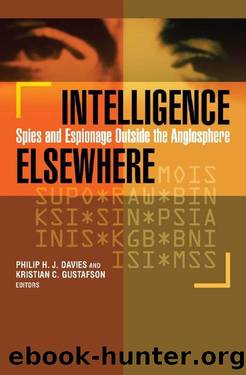Intelligence Elsewhere: Spies and Espionage Outside the Anglosphere by Philip H. J. Davies & Kristian C. Gustafson

Author:Philip H. J. Davies & Kristian C. Gustafson [Davies, Philip H. J. & Gustafson, Kristian C.]
Language: eng
Format: epub, azw3, mobi
Tags: Political Science, Security (National & International), Intelligence & Espionage, History, Military, Strategy, General
ISBN: 9781589019577
Google: qOFvxq7TdhgC
Publisher: Georgetown University Press
Published: 2013-03-15T15:07:10+00:00
C H A P T E R 9
Intelligence and
Security-Sector Reform
in Indonesia
Peter Gill and Lee Wilson
InthepastthirtyyearsthroughoutEurope,theAmericas,andmoresporadi-
cally elsewhere, the issue of how to institute some democratic control over security intelligence agencies has steadily permeated the political agenda.
This shift has been a central, and sometimes painful, aspect of the democratization of formerly authoritarian regimes, both civilian and military. For example, the death of the dictator Francisco Franco in 1976 precipitated democratization in Spain that included the demilitarization of intelligence. Military rule ended in Brazil in 1985, though the military-dominated National Intelligence Service was not replaced until 1990 as part of a continuing process of demilitarization.
During the years 1993â94, a more rapid transformation of formerly repressive security agencies was attempted in South Africa. In the countries of the former Soviet bloc, no agency has been immune from the changesâalthough the
amount of real, as opposed to nominal, reform varies widely. Even in what might be described as the ââoldââ democracies of North America, Western Europe, Australia, and New Zealand, legislative or judicial inquiries into scandals involving abuses of power and rights by the agencies have resulted in new legal and oversight structures for the agencies.
Such changes have been less common in Asia, though there are exceptions, such as South Korea. 1 In this chapter we examine the situation in Indonesia,
/ 157 /
158 / Peter Gill and Lee Wilson
where the first law on state intelligence was passed in 2011. We discuss the competing approaches to the analysis of intelligence democratization; provide an account of the development of intelligence since the country achieved independence; and analyze the current prospects for democratization given the social, economic, and political context of the countryâs state and security networks.
What Do We Mean by Intelligence Democratization?
Elsewhere, one of us has suggested that intelligence can be defined as ââmainly secret activitiesâtargeting, collection, analysis, dissemination, and actionâ
intended to enhance security and/or maintain power relative to competitors by forewarning of threats and opportunities.ââ2 But our interest is in how to define democratic intelligence. We suggest that it can be defined by adding the following: ââThese activities will be subject to control and oversight in the interests of effectiveness, efficiency, legality and respect for rights.ââ In general, the characteristics of intelligence under authoritarianism include the lack of any legal mandate; a plurality of agencies; repression of regime opponents, including frequent human rights abuses and public fear mongering; and secret budgets and involvement in corruption. Democratization requires more than elections; it can only be achieved through interrelated political and legal mechanisms capable of maintaining accountability in this most secretive area of statesâ activities.
Analysis in this area deploys two main models; in the Americas it is most likely to be civilâmilitary relations (CMR), whereas in Europe it is more likely to be security-sector reform (SSR). 3 Bruneau and Boraz argue that intelligence ââcan best be conceptualized as a subset of civilâmilitary relations,ââ and therefore that intelligence reform should be studied via three fundamental issues of CMR: democratic civilian control, effectiveness in achieving roles and missions, and efficiency. 4
Download
Intelligence Elsewhere: Spies and Espionage Outside the Anglosphere by Philip H. J. Davies & Kristian C. Gustafson.azw3
Intelligence Elsewhere: Spies and Espionage Outside the Anglosphere by Philip H. J. Davies & Kristian C. Gustafson.mobi
This site does not store any files on its server. We only index and link to content provided by other sites. Please contact the content providers to delete copyright contents if any and email us, we'll remove relevant links or contents immediately.
| Espionage | Hoaxes & Deceptions |
| Murder & Mayhem | Organized Crime |
| Serial Killers | White Collar Crime |
Mindhunter: Inside the FBI's Elite Serial Crime Unit by John E. Douglas & Mark Olshaker(9317)
Wiseguy by Nicholas Pileggi(5769)
Room 212 by Kate Stewart(5102)
Hitman by Howie Carr(5089)
Secrecy World by Jake Bernstein(4740)
Killers of the Flower Moon: The Osage Murders and the Birth of the FBI by David Grann(4435)
Papillon (English) by Henri Charrière(4258)
Breaking Free by Rachel Jeffs(4216)
Killers of the Flower Moon by David Grann(4037)
Say Nothing by Patrick Radden Keefe(3975)
American Kingpin by Nick Bilton(3875)
The Secret Barrister by The Secret Barrister(3696)
Molly's Game: From Hollywood's Elite to Wall Street's Billionaire Boys Club, My High-Stakes Adventure in the World of Underground Poker by Molly Bloom(3528)
Mysteries by Colin Wilson(3444)
In Cold Blood by Truman Capote(3374)
Signature in the Cell: DNA and the Evidence for Intelligent Design by Stephen C. Meyer(3125)
I'll Be Gone in the Dark by Michelle McNamara(3080)
Rogue Trader by Leeson Nick(3039)
Bunk by Kevin Young(2992)
